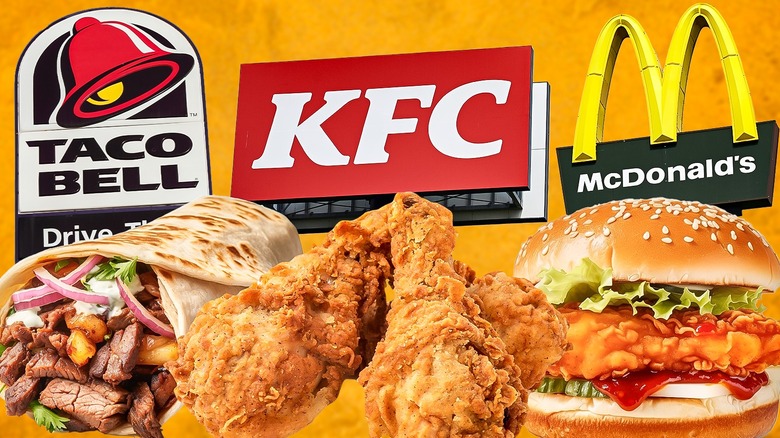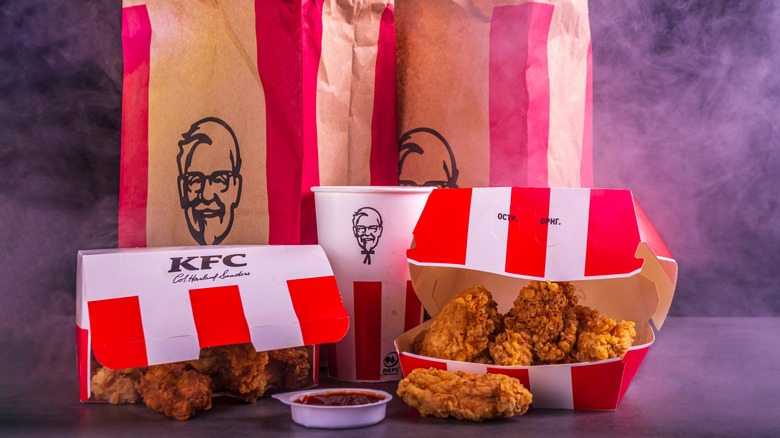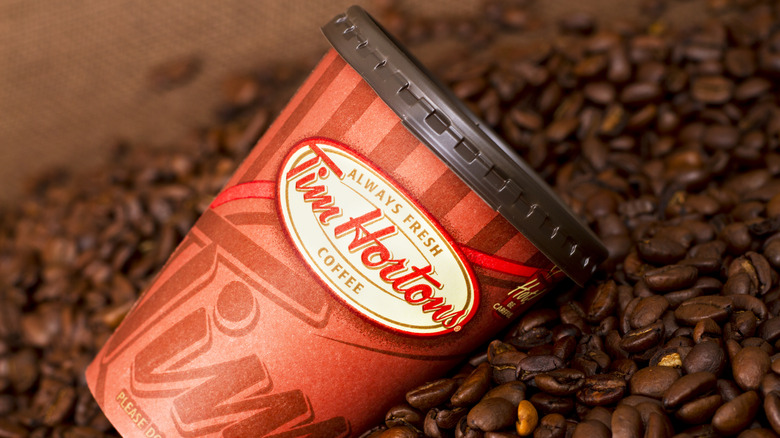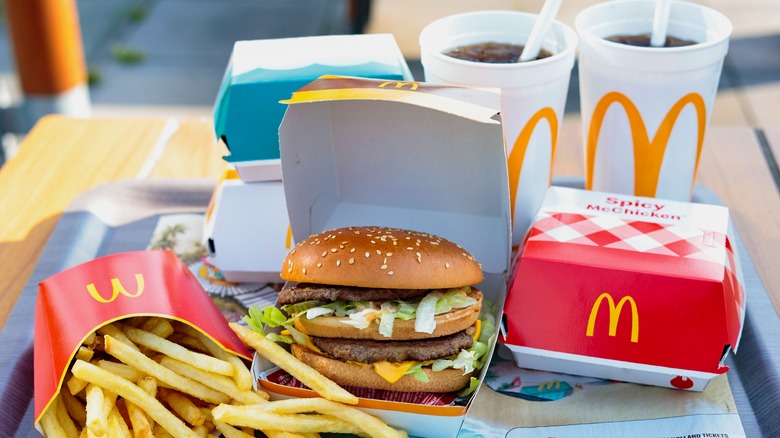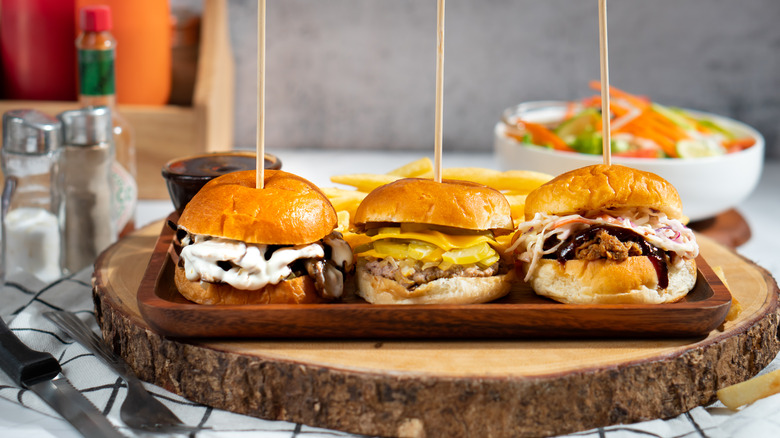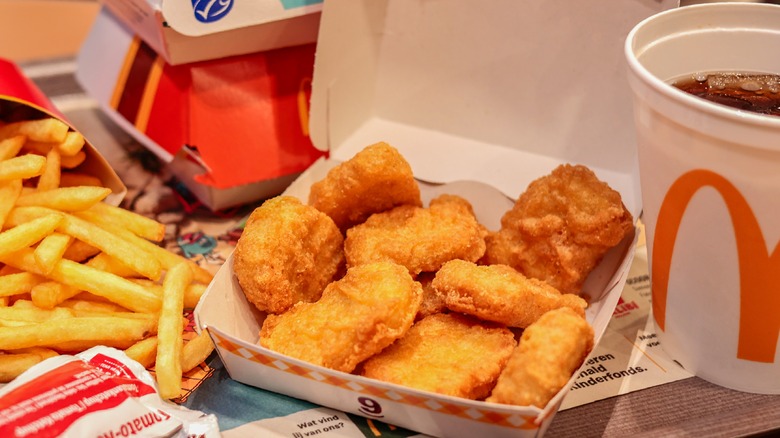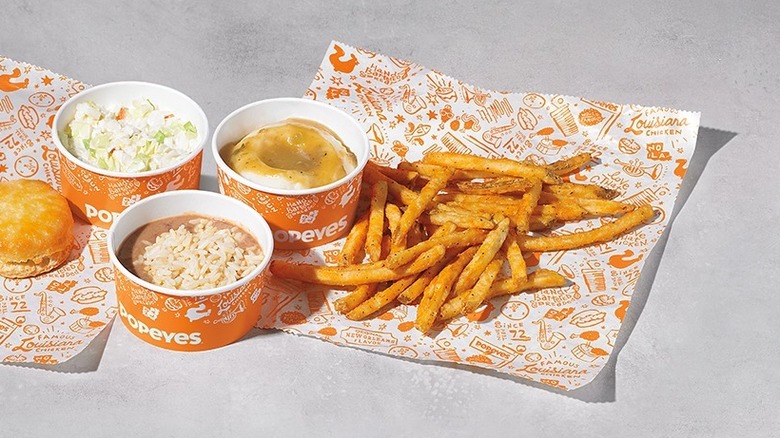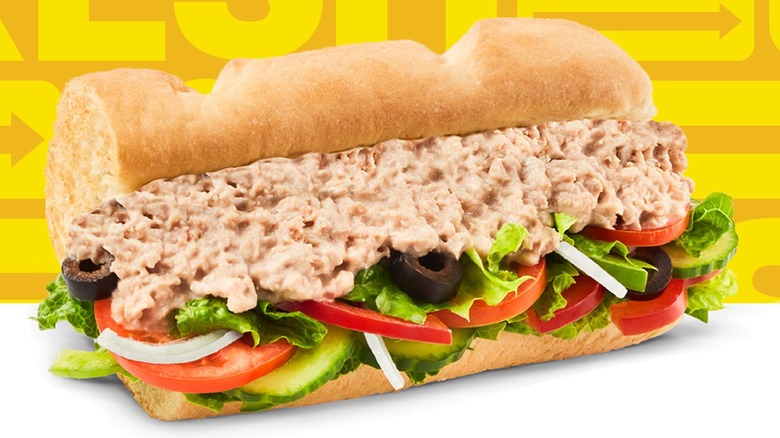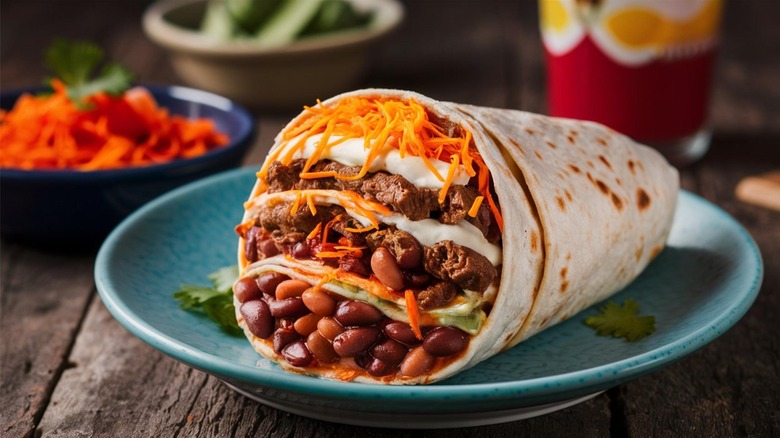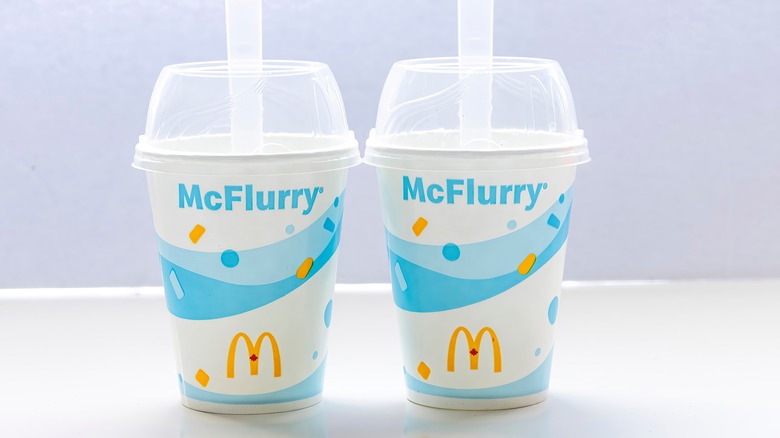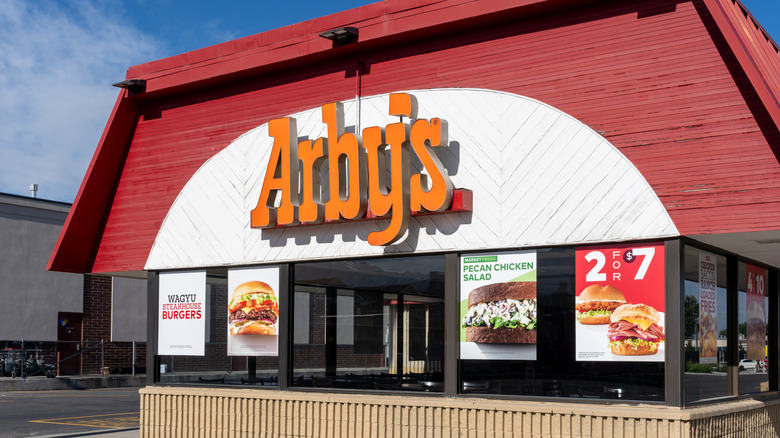10 Myths About Fast Food Restaurants You Can Stop Believing
Although the biggest concentration of fast food restaurants in the U.S. can be found across California, Texas, and New York, fast food is a part of the eating culture all across the country. Ranking fast food restaurants from most to least appetizing can prove to be subjective and difficult, yet regardless of your chosen chain, people are crazy about those colorful and eclectic comfort food havens. And why shouldn't they be? Fast food offers a plethora of value meals, tasty desserts, and signature sauces, not to mention practical drive-thru section. Yet, despite juxtaposition with being a key part of how we feed ourselves, one thing that seems to be persistent across every chain are the ill-intentioned rumors that come with them.
To be fair, many fast food joints have built themselves quite a bad reputation when it comes to certain questionable ingredients and potential health risks. Still, the age of the internet has helped cause a proliferation urban legends and myths about fast food restaurants. It's no wonder, then, that those restaurants are often hit by accusations concerning their industry in general and specific menu items in particular. While some of these bizarre myths may stem from reasonable concerns, many are unfounded and downright wild. Let's set the record straight once and for all.
Myth: Kentucky Fried Chicken shortened its name to KFC because it turned to lab-grown chicken
Founded in 1930 and headquartered in Louisville, KFC has over 30,000 locations across the globe. Formerly called Kentucky Fried Chicken, it rebranded as KFC in 1991. Ever since then, rumors have circulated and people have even taken online to claim that in order to cut down on production cost, the brand made the call to switch to genetically engineered chicken. Those creepy mutant chickens are supposedly devoid of feathers, feet, and beaks altogether.
The official explanation from the brand's representatives dismissed those far-fetched accusations, though. The name change apparently happened not only because the acronym is shorter and flows better phonetically, but also to eliminate the word "fried" and its negative connotation among health-conscious consumers. Not to mention that in order to keep the original full name, the company would have allegedly been charged licensing fees by the Commonwealth of Kentucky. Either way, KFC clearly states on its website, "We use 100% real chicken raised on U.S. farms. Our chicken is USDA inspected for quality before it can be delivered to our kitchens."
Myth: Tim Hortons' coffee contains nicotine and MSG
According to Drive Research, 73% of Americans drink coffee daily, and 36% of them indulge in at least three cups a day. It's safe to assume, then, that this comforting and invigorating beverage, be it hot or cold, is massively and regularly consumed. So much that some people have resented that "addiction" and directed their suspicion at Tim Hortons in particular, Canada's largest fast food chain. Based in Toronto, this coffee house and restaurant is also present across 11 states and has turned into quite a popular breakfast spot, offering egg muffins, donut, bagels ... and allegedly coffee that contains traces of nicotine — with a good dose of MSG.
Could this Tim Horton's conspiracy be true? Let's use logic for a second. The Canadian Food Inspection Agency is known for its extremely rigorous rules, and it aims to protect Canadians from "preventable food safety hazards" and "food fraud." It would therefore never allow the inclusion of nicotine — whose harmful effects may include cancer, chronic kidney disease, and respiratory problems — to unsuspecting consumers.
The brand addresses those concerns on its website anyway, claiming, "This urban myth is just that ... a myth! ... There is absolutely NO nicotine or MSG in our coffee." While Tim Horton's coffee does not contain additives, it is full of premium-quality Arabica beans, which are clearly good enough to keep consumers coming back for more.
Myth: McDonald's food is so artificial it never spoils
While some items may actually be healthier and more nutritious than others, many fast foods items are loaded with sugar, sodium, saturated fats, preservatives, and artificial flavors and colorings. Like any sandwich, fast food burgers are supposed to lose top quality after a few hours if left in a cupboard or at room temperature, but how long does it actually take for them to show visible signs of decay? Some items seem to go bad within a few days, but McDonald's hamburgers, French fries, and chicken nuggets allegedly remain unchanged in unrefrigerated storage for weeks, months, and even years, as per several photos and videos circulating online.
McDonald's responded that these documented products could have simply dried out or become dehydrated on their own, but that they would have likely decomposed or grown mold if certain environmental factors had been met, like excessive moisture. The brand added, "The reality is that our burgers are made only with 100% USDA inspected beef. There are no preservatives or fillers in our patties, and the only thing ever added is a touch of salt and pepper on the grill."
In fact, with its two 100% beef patties, the McDouble is not only an affordable meal, but it also provides 22 grams of protein, making it one of the most nutritious choices from the chain. But as the brand reminds customers, burgers may not have any additives, but the pickle does contain an artificial preservative, so you might consider leaving that off.
Myth: White Castle's sliders don't contain onions, but shredded cabbage or turnips
Based in Columbus, Ohio, White Castle is a nationwide fast food chain that has been around since 1921. It's known for its flavorful square burgers, called sliders, which come in 13 different variations, from bacon cheese to crispy chicken breast and panko breaded fish. Popular as these items may be, there is a rumor that the onions in White Castle's sliders are nothing but shredded cabbage, or even turnips, marinated in some onion juice. Could this really be the case?
There is no logic to that claim, if only because onions have a different texture, crunch, and taste to begin with. Plus, they're an inexpensive vegetable and available year-round; so, there is no convincing reason for any restaurant to trick customers with such a useless switch. Why substitute yellow onions — which cost on average under $1.50 per pound across America at the time of writing — with more expensive vegetables? By comparison, a pound of green cabbage or turnips average about the same price across the States. Nonetheless, to ease concerns, White Castle has uploaded a full list of ingredients on its website, and it clearly includes fire-roasted, dried, and caramelized onions.
Myth: Some McDonald's items contain pink slime
You've probably seen the "leaked" photos and videos of a disgusting-looking pink goo comparable to a lumpy batch of frozen strawberry yogurt. Netizens claimed it was the same chemical substance that McDonald's used in its chicken nuggets and beef to give them a consistent texture. The culprit was supposed to be ground lean beef treated with ammonium hydroxide, and it was given much-publicized heat from celebrity chef Jamie Oliver in 2012.
The brand responded by posting videos showing how McNuggets are actually made, claiming on its website, "We've seen the photo of 'pink goop' or 'pink slime' in association with McDonald's ... We don't know where it came from, but it's not our food. The photo is not a representation of how we create our Chicken McNuggets, or for that matter, any item on our menu." McDonald's continues by asserting that it's Chicken McNuggets are made from 100% USDA-inspected white meat.
There may not be any pink ooze in McDonald's food (anymore?), but there may be another suspicious ingredient frequently used by the brand to keep in mind. It seems that the industrial chemical azodicarbonamide is baked into the McRib's rolls to strengthen their texture; its side effects likely include respiratory problems, hormonal imbalance, and increased intolerance to gluten. As for the McNuggets? McDonald's may use real chicken, but it is reformed nugget from a combination of breast, tenderloin, and rib meat.
Myth: The fries at McDonald's, Checkers, and Popeyes are fully vegan
To widen their clientele, fast food chains now cater to vegetarians and vegans with a wide array of items, from Starbucks' plant-based breakfast sandwich to Subway's substantial vegan wraps. There is, however, a widespread misconception that the french fries in any fast food restaurant are completely vegan. That may not necessarily be true.
Burger King's classic fries and Arby's curly fries may be vegan, but in other chains, potatoes are likely fried in lard or contain traces of dairy. Sometimes, they're even cooked in the same oil that is used for beef and chicken. Case in point: McDonald's, Checkers Drive-In, and Popeyes Louisiana Kitchen. In the U.S., McDonald's fries are cooked in oil that contains natural beef flavor, a meatless additive that includes dairy derivatives – as well as wheat, to the detriment of consumers with gluten intolerance or allergies. As for Checkers' fries, they're dipped in milk powder and cooked in lard, while Popeyes fries its potatoes in beef tallow.
Another common myth is that fast food fries aren't made from actual potatoes, but there are actually many chains offering fries cut from fresh potatoes: Five Guys sources them from Idaho, while Wahlburgers uses Yukon Gold.
Myth: Subway's chicken is mostly soy, and its tuna is fake
Headquartered in Shelton, Connecticut, Subway has been proposing freshly-made customizable sandwiches since 1965. In 2017, a Canadian company conducted DNA tests on its oven-roasted chicken and sweet onion chicken teriyaki sandwiches and claimed that they mostly contained soy DNA. It found a lot more chicken DNA in McDonald's country chicken, Tim Hortons' chipotle chicken grilled wrap, and Wendy's grilled chicken sandwich.
Subway addresses that claim on its website, stating, "Our chicken is and has always been 100% real chicken ... There is a small amount of soy protein in the seasoning, spices, and marinade (less than 1%) to help maintain moisture and texture." It also confirms that all the proteins found on its U.S. menu are monitored by the USDA.
This is not the only myth pertaining to Subway, though. Following DNA tests conducted by UCLA's Department of Ecology and Evolutionary Biology, a lawsuit was filed against the brand claiming there wasn't any real tuna in its sandwiches. More people have come forward with that same accusation; so, Subway has taken to its website to assure its customers that it fully uses wild-caught tuna, sourced from Thailand, Indonesia, and the Philippines. The brand stresses that its tuna meets FDA compliance, and abides by very strict quality, safety, and sourcing requirements. Most notably, the company reveals a bit into its allocation processes, confirming that franchisees "receive tuna sealed in pouches for continued quality control and food safety purposes."
Myth: Taco Bell uses grade-D beef
Ever since its inception in 1962, Taco Bell has been the go-to destination for satisfying Tex-Mex food on-the-go, from tacos to quesadillas and burritos. This doesn't mean the beloved brand has never been affected by allegations, though. It turns out there is a rumor claiming that the brand may be using grade D beef, i.e., very low-quality, but still edible meat that is good enough as pet food. There was even a lawsuit in Alabama claiming that its seasoned beef was, in fact, only 36% meat.
To begin with, there is no letter grading system for beef in the U.S.; there are only prime, choice, select, utility, cutter, and canner grades. Canada, however, does have something called Grade D beef, but it only refers to cuts from older cattle. Taco Bell dismisses that unfounded issue with this crystal-clear statement anyway: "We use 100% USDA premium beef in our seasoned beef. We prepare it much the same way you prepare taco meat at home: after simmering, it is drained of excess fat and pre-seasoned with our signature blend of seven authentic seasonings and spices. It is then packaged with added water to lock in the flavor and for added moisture, and then shipped to our restaurants. Each of our restaurants prepares our beef following the same steps."
Myth: The McFlurry machine keeps breaking down
We've all seen the countless photos, message boards, and memes (semi-angrily) poking fun at McDonald's' McFlurry machine and how it's broken most of the time, thus depriving upset customers of this widely popular frozen treat. There is even a website called McBroken that supposedly monitors the state of the brand's soft serve machines across the U.S., labeling them as "working," "broken," or "inconclusive." The anxiety and longing are real.
The truth is that the chain's staff may simply be concealing the truth from its patrons. It seems that said machine needs a whopping four hours to clean because its seven parts have to be taken down and sanitized individually. It's a tiresome, tedious, and time-consuming chore. Therefore, claiming that the mechanism is out of order while the device is actually being thoroughly cleaned seems to be the fastest and easiest way to contain people's disappointment.
Myth: Arby's name is a play on R.B., short for roast beef
Established in 1964 and headquartered in Atlanta, Arby's is a fast food sandwich restaurant chain with over 3,600 branches around the world. Though its menu features several beloved classics like curly fries, chicken burgers, and milkshakes, slow-roasted beef sandwiches remain the star items. There are many variations available, from bourbon barbecue brisket to half pound, beef and cheddar, and French dip with Swiss cheese. Consequently, there is a common misconception floating around that the brand's name is the phonetic spelling of R.B., which could be short for roast beef, after those iconic sandwiches.
Though this theory may not be that far-fetched and may even seem amusing to some, it couldn't be further from the truth. R.B. apparently refers to the names of the founders, Leroy and Forrest Raffel, collectively known as the Raffel Brothers. It's not that complicated, after all.
